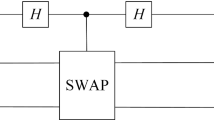Abstract
Based on the asymmetric quantum cryptosystem, a new public-key quantum signature scheme is proposed. In our scheme, the signer’s public key is derived from her public identity information, and the corresponding private key is generated by the trusted private key generator (PKG). Both of the public key and the private key are classical bit strings, so they are easily kept. It is very convenient for the key management of the quantum signature system. The signer signs a message with her private key, and the quantum signature can be publicly verified with the signer’s public key and the quantum one-way function. Both of the private key and public key can be reused. On the other hand, in the signing phase, the signer sends the message to PKG via a classical unencrypted channel, which can be used to authenticate the identity of the signer. The proposed scheme has the properties of completeness, information-theoretic security, non-repudiation and unforgeability. Its information-theoretic security is ensured by quantum indistinguishability mechanics. On the other hand, our scheme is more efficient than the similar schemes.

Similar content being viewed by others
References
Shor, P.W.: Polynomial-time algorithms for prime factorization and discrete logarithms on a quantum computer. SIAM J. Comput. 26(5), 1484–1509 (1997)
Wiesner, S.: Conjugate coding. SIGACT News. 15, 78–88 (1983)
Bennett, C. H., Brassard, G.: Quantum cryptography: public key distribution and coin tossing. In: Proceedings of the IEEE International Conference on Computers Systems and, Signal Processing, pp. 175–179, IEEE, New York (1984)
Gottesman, D., Chuang, I.: Quantum digital signatures. ar**v: quant-ph/0105032 (2001)
Zeng, G.H., Keitel, C.H.: Arbitrated quantum-signature scheme. Phys. Rev. A. 65(4), 042312 (2002)
Li, Q., Chan, W.H., Long, D.Y.: Arbitrated quantum signature scheme using bell states. Phys. Rev. A. 79(5), 054307 (2009)
Zou, X., Qiu, D.: Security analysis and improvements of arbitrated quantum signature schemes. Phys. Rev. A. 82(4), 042325 (2010)
Zhang, K.J., Zhang, W.W., Li, D.: Improving the security of arbitrated quantum signature against the forgery attack. Quantum Inf. Process. 12(8), 2655–2669 (2013)
Luo, M.X., Chen, X.B., Yun, D., Yang, Y.X.: Quantum signature scheme with weak arbitrator. Int. J. Theor. Phys. 51(7), 2135–2142 (2012)
Su, Q., Li, W.M.: Improved quantum signature scheme with weak arbitrator. Int. J. Theor. Phys. 52(9), 3343–3352 (2013)
Kang, M.S., Hong, C.H., Heo, J., Lim, J.I., Yang, H.J.: Quantum signature scheme using a single qubit rotation operator. Int. J. Theor. Phys. 54(2), 614–629 (2015)
Guo, Y., Feng, Y., Huang, D.: Arbitrated quantum signature scheme with continuous-variable coherent states. Int. J. Theor. Phys. 55(4), 2290–2302 (2016)
Ma, H., Li, F., Mao, N., Wang, Y., Guo, Y.: Network-based arbitrated quantum signature with graph state. Int. J. Theor. Phys. 56(8), 2551–2561 (2017)
Fatahi, N., Naseri, M., Gong, L.H., Qing, H.L.: High-efficient arbitrated quantum signature scheme based on cluster states. Int. J. Theor. Phys. 56(2), 609–616 (2017)
Gao, F., Qin, S.J., Guo, F.Z., Wen, Q.Y.: Cryptanalysis of the arbitrated quantum signature protocols. Phys. Rev. A. 84(2), 022344 (2011)
Liu, F., Zhang, K., Cao, T.: Security weaknesses in arbitrated quantum signature protocols. Int. J. Theor. Phys. 53(1), 277–288 (2014)
Li, Q., Chan, W.H., Wu, C.: On the existence of quantum signature for quantum. Int. J. Theor. Phys. 52(12), 4335–4341 (2013)
Zhang, K., Qin, S., Sun, Y., Song, T.T., Su, Q.: Reexamination of arbitrated quantum signature: the impossible and possible. Quantum Inf. Process. 12(9), 3127–3141 (2013)
Kang, M.S., Hong, C.H., Heo, J.: Comment on “quantum signature scheme with weak arbitrator”. Int. J. Theor. Phys. 53(6), 1862–1866 (2014)
Zou, X., Qiu, D., Yu, F., Mateus, P.: Security problems in the quantum signature scheme with a weak arbitrator. Int. J. Theor. Phys. 53(2), 603–611 (2014)
Li, Q., Li, C., Wen, Z., Zhao, W., Chan, W.H.: On the security of arbitrated quantum signature schemes. J. Phys. A-Math. Theor. 46(1), 015307 (2012)
Shamir, A.: Identity-based cryptosystems and signature schemes. In: The Workshop on the Theory and Application of Cryptographic Techniques, pp. 47–53. Springer, Heidelberg (1984)
Chen, F.L., Liu, W.F., Chen, S.G., Wang, Z.H.: Public-key quantum digital signature scheme with one-time pad private-key. Quantum Inf. Process. 17(10), 1–14 (2018)
Kahn, D.: The codebreakers. Macmillan, New York (1967)
Shannon, C.E.: Communication theory of secrecy systems. Bell Syst. Tech. J. 28(4), 656–715 (1949)
Nielsen, M.A., Chuang, I.L.: Quantum Computation and Quantum Information. Cambridge University Press, Cambridge (2000)
Boykin, P.O., Roychowdhury, V.: Optimal encryption of quantum bits. Phys. Rev. A. 67(4), 042317 (2003)
Zhou, N.Y., Liu, Y., Zeng, G.H., **ong, J., Zhou, F.C.: Novel qubit block encryption algorithm with hybrid keys. Phys. A. 375(2), 693–698 (2007)
Buhrman, H., Cleve, R., Watrous, J., de Wolf, R.: Quantum fingerprinting. Phys. Rev. Lett. 87(16), 167902 (2001)
Menezes, A.J., Oorschot, P.V., Vanstone, S.A.: Handbook of applied cryptography. CRC Press, Boca Raton (1996)
Yang, L., Yang, B., Pan, J.: Quantum public-key encryption protocols with information-theoretic security, Proceedings of SPIE—The International Society for Optical Engineering, p.8440, IEEE, New York (2010)
Yang, L., **ang, C., Li, B.: Quantum probabilistic encryption scheme based on conjugate coding. China Commun. 10(2), 19–26 (2013)
Author information
Authors and Affiliations
Corresponding author
Additional information
Publisher’s Note
Springer Nature remains neutral with regard to jurisdictional claims in published maps and institutional affiliations.
Rights and permissions
About this article
Cite this article
**n, X., Wang, Z., He, Q. et al. New Public-key Quantum Signature Scheme with Quantum One-Way Function. Int J Theor Phys 58, 3282–3294 (2019). https://doi.org/10.1007/s10773-019-04203-7
Received:
Accepted:
Published:
Issue Date:
DOI: https://doi.org/10.1007/s10773-019-04203-7




